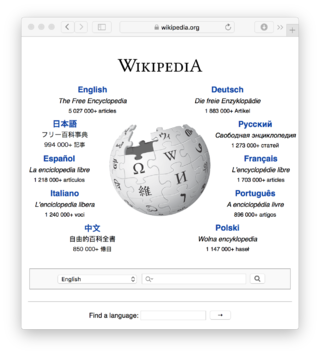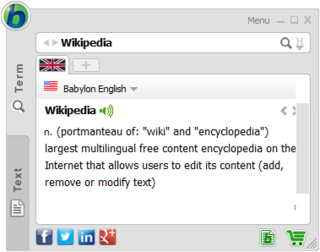Related Research Articles
Portable Document Format (PDF), standardized as ISO 32000, is a file format developed by Adobe in 1992 to present documents, including text formatting and images, in a manner independent of application software, hardware, and operating systems. Based on the PostScript language, each PDF file encapsulates a complete description of a fixed-layout flat document, including the text, fonts, vector graphics, raster images and other information needed to display it. PDF has its roots in "The Camelot Project" initiated by Adobe co-founder John Warnock in 1991.
The Rich Text Format is a proprietary document file format with published specification developed by Microsoft Corporation from 1987 until 2008 for cross-platform document interchange with Microsoft products. Prior to 2008, Microsoft published updated specifications for RTF with major revisions of Microsoft Word and Office versions.

Wiki software, is collaborative software that runs a wiki, which allows the users to create and collaboratively edit pages or entries via a web browser. A wiki system is usually a web application that runs on one or more web servers. The content, including previous revisions, is usually stored in either a file system or a database. Wikis are a type of web content management system, and the most commonly supported off-the-shelf software that web hosting facilities offer.
A translation memory (TM) is a database that stores "segments", which can be sentences, paragraphs or sentence-like units that have previously been translated, in order to aid human translators. The translation memory stores the source text and its corresponding translation in language pairs called “translation units”. Individual words are handled by terminology bases and are not within the domain of TM.

Web conferencing is used as an umbrella term for various types of online conferencing and collaborative services including webinars, webcasts, and web meetings. Sometimes it may be used also in the more narrow sense of the peer-level web meeting context, in an attempt to disambiguate it from the other types known as collaborative sessions. The terminology related to these technologies is exact and agreed relying on the standards for web conferencing but specific organizations practices in usage exist to provide also term usage reference.
Open-source software development (OSSD) is the process by which open-source software, or similar software whose source code is publicly available, is developed by an open-source software project. These are software products available with its source code under an open-source license to study, change, and improve its design. Examples of some popular open-source software products are Mozilla Firefox, Google Chromium, Android, LibreOffice and the VLC media player.

OmegaT is a computer-assisted translation tool written in the Java programming language. It is free software originally developed by Keith Godfrey in 2000, and is currently developed by a team led by Aaron Madlon-Kay.

Babylon is a computer dictionary and translation program developed by the Israeli company Babylon Software Ltd. based in the city of Or Yehuda. The company was established in 1997 by the Israeli entrepreneur Amnon Ovadia. Its IPO took place ten years later. It is considered a part of Israel's Download Valley, a cluster of software companies monetizing "free" software downloads through adware. Babylon includes in-house proprietary dictionaries, as well as community-created dictionaries and glossaries. It is a tool used for translation and conversion of currencies, measurements and time, and for obtaining other contextual information. The program also uses a text-to-speech agent, so users hear the proper pronunciation of words and text. Babylon has developed 36 English-based proprietary dictionaries in 21 languages. In 2008–2009, Babylon reported earnings of 50 million NIS through its collaboration with Google.

General Architecture for Text Engineering or GATE is a Java suite of tools originally developed at the University of Sheffield beginning in 1995 and now used worldwide by a wide community of scientists, companies, teachers and students for many natural language processing tasks, including information extraction in many languages.
The following is a comparison of e-book formats used to create and publish e-books.
Biblical software or Bible software is a group of computer applications designed to read, study and in some cases discuss biblical texts and concepts. Biblical software programs are similar to e-book readers in that they include digitally formatted books, may be used to display a wide variety of inspirational books and Bibles, and can be used on portable computers. However, biblical software is geared more toward word and phrase searches, accessing study bible notes and commentaries, referencing various modern translations, cross-referencing similar passages and topics, biblical dictionaries, original language texts and language tools, maps, charts, and other e-books deemed relevant to understanding texts from a philological approach.
A.nnotate is a web service for storing and annotating documents. Documents are either uploaded by the user or fetched from a web address supplied by the user. Uploads are accepted as PDF, Microsoft Word, office formats supported by OpenOffice and common image formats. When a URL of a web page is entered, the service makes a local copy of the HTML and stylesheet. The service offers a browser bookmarklet to facilitate making snapshots of web pages.
openTMS is an acronym for Open Source Translation Management System.

Text annotation is the practice and the result of adding a note or gloss to a text, which may include highlights or underlining, comments, footnotes, tags, and links. Text annotations can include notes written for a reader's private purposes, as well as shared annotations written for the purposes of collaborative writing and editing, commentary, or social reading and sharing. In some fields, text annotation is comparable to metadata insofar as it is added post hoc and provides information about a text without fundamentally altering that original text. Text annotations are sometimes referred to as marginalia, though some reserve this term specifically for hand-written notes made in the margins of books or manuscripts. Annotations have been found to be useful and help to develop knowledge of English literature.
Nota Bene consists of a tightly integrated software suite of applications, including word processing, reference management and document text analysis software that is focused on writers and scholars in the Humanities, Social Sciences, and the Arts. The integrated suite is referred to as the Nota Bene Workstation. It operates on the Windows platform and on Mac computers.
Microsoft Office shared tools are software components that are included in all Microsoft Office products.
Art of Illusion is a free software, and open source software package for making 3D graphics.

Obsidian is a knowledge base and note-taking software that operates on Markdown files. It allows users to make internal links for notes and then to visualize the connections as a graph. It is designed to help users organize and structure their thoughts and knowledge in a flexible, non-linear way. The software is free for personal use, with commercial licenses available for pay. Obsidian is popular among writers, researchers, academics, and other professionals who need a flexible and powerful note-taking tool.